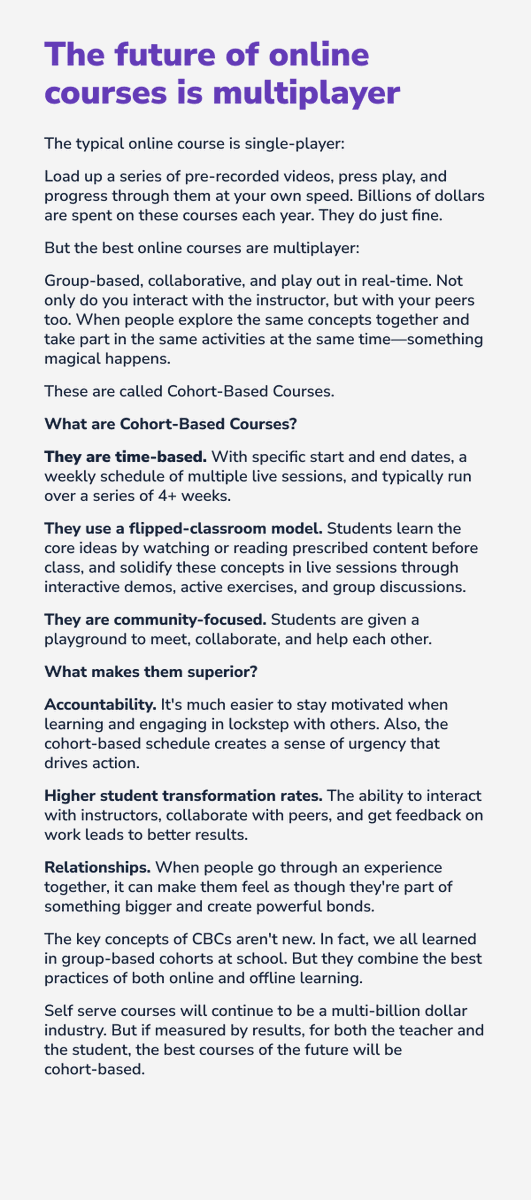10 years ago, pre-recorded video and asynchronous leaning was the pinnacle of online learning.
But in 2021 and beyond, is this really the best we can do?

But in 2021 and beyond, is this really the best we can do?


The typical online course is single-player:
Load up a series of pre-recorded videos, press play, and progress through them at your own speed. Billions of dollars are spent on these courses each year. They do just fine.
Load up a series of pre-recorded videos, press play, and progress through them at your own speed. Billions of dollars are spent on these courses each year. They do just fine.
But the best online courses are multiplayer:
Group-based, collaborative, and play out in real-time. When people explore the same concepts together, and take part in the same activities, at the same time... something magical happens.
Group-based, collaborative, and play out in real-time. When people explore the same concepts together, and take part in the same activities, at the same time... something magical happens.
These are called Cohort-Based Courses (CBCs). What are CBCs, and how are they different than self paced courses?
CBCs are time-based. With specific start and end dates, a weekly schedule of multiple live sessions, and typically run over a series of 4+ weeks.
CBCs are time-based. With specific start and end dates, a weekly schedule of multiple live sessions, and typically run over a series of 4+ weeks.
CBCs use a flipped-classroom model. Students learn the core ideas by watching or reading prescribed content before class, and solidify these concepts in live sessions through interactive demos, active exercises, and group discussions.
CBCs are community-focused. Students are given a playground to meet, collaborate, and help each other.
What makes them superior?
Accountability. It's much easier to stay motivated when learning and engaging in lockstep with others. Also, the cohort-based schedule creates a sense of urgency that drives action.
Accountability. It's much easier to stay motivated when learning and engaging in lockstep with others. Also, the cohort-based schedule creates a sense of urgency that drives action.
Higher student transformation rates. The ability to interact with instructors, collaborate with peers, and get feedback on work leads to better results.
Relationships. When people go through an experience together, it can make them feel as though they're part of something bigger and create powerful bonds.
The key concepts of CBCs aren't new. In fact, we all learned in group-based cohorts at school. But they combine the best practices of both online and offline learning.
Self serve courses will continue to be a multi-billion dollar industry. But if measured by results, for both the teacher and the student, the best courses of the future will be cohort-based.
Examples of Cohort-based courses:
• http://buildingasecondbrain.com
• http://academy.aliabdaal.com
• http://writeofpassage.school
• http://supercreative.design
• http://lambdaschool.com
• http://www.reforge.com
• http://beondeck.com
• http://flockjay.com
• http://altmba.com
• http://buildingasecondbrain.com
• http://academy.aliabdaal.com
• http://writeofpassage.school
• http://supercreative.design
• http://lambdaschool.com
• http://www.reforge.com
• http://beondeck.com
• http://flockjay.com
• http://altmba.com
If you want to learn more about CBCs, read these threads and follow these people:
If you enjoyed this thread and want to learn more about online education or the creator economy, follow me @ryangum and signup for my newsletter: http://ryangum.com

 Read on Twitter
Read on Twitter


